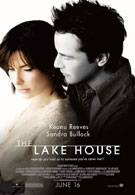In The Lake House, Keanu Reeves and Sandra Bullock are reunited for the first time since guiding bomb-laden buses to safety in Speed. Instead of fighting crime, they face the trickier battle of racing against time. Adding a whole new meaning to long distance relationships, Alex (Reeves) and Kate (Bullock) try to make their romance last like any other 30-something couple ready to settle down, but there is one small problem: he is living in 2004, while she is living in 2006.
In the beautiful city of Chicago, Kate the doctor has recently left her adorable lake house to move into a luxury apartment complex. She leaves a note in the mailbox for the new tenant, Alex the architect, and asks that he please forward her mail. After a few responses back and forth, they realize they are not only living two years apart but also sharing a female dog named Jack. The special mailbox serves as a mini-time machine where letters appear without the aid of a postman, and the flag shoots up as if to shout, “You’ve got mail”. The two lonely hearts quickly fall in love and try to find a way to beat the clock; it’s a wonder they can find the time in between all their sulking, moping, and morose ramblings.
Alex and Kate are not particularly interesting people, which makes the plot feel like it’s struggling to crawl across a sticky floor. They both carry a quiet intensity that provokes them to speak barely above whispers, and stay distant from romantic prospects in the real world, Morgan (Dylan Walsh) and Mona (Lynn Collins). Even with a supernatural premise, The Lake House seems like a strangely conventional romantic movie. There are two boring people looking to connect, spending most of the movie apart while the audience shifts in their seats and, of course, having an obligatory argument that keeps them apart before the big finish. Adding a wormhole effect does not make this tired premise any more invigorating.
Since The Lake House is essentially a time-travel romance, it requires a large amount of suspending disbelief and silencing the left side of your brain. The problem is that even if you can accept the illogical time warp aspects—which are viable in good movies like Donnie Darko or Back To The Future—there are simply too many script holes and inconsistencies to keep The Lake House from collapsing. Take for example, the fact that Kate lives in 2006 and somehow never thinks to pick up the phone and call Alex, or even look him up on the internet to see where he ends up two years later—an act that would have saved everyone a lot of trouble.
Based on the 2000 Korean film Il Mare, a film I have not seen but suspect is superior, The Lake House never finds the magic it is seeking. The script by David Auburn (Proof) is far too disjointed for its own good, and director Alejandro Agresti seems frequently lost. The sluggish pace weighs down the story and the ending is thought-provoking, but not in a good way; you'll get a headache trying to make sense of things that lack any kind of cohesive structure. The film’s strength is its scenic shots of Chicago, but taking a walk through Grant Park and staring up at Buckingham Fountain is more magical than anything featured in The Lake House.
Your Daily Blend of Entertainment News

